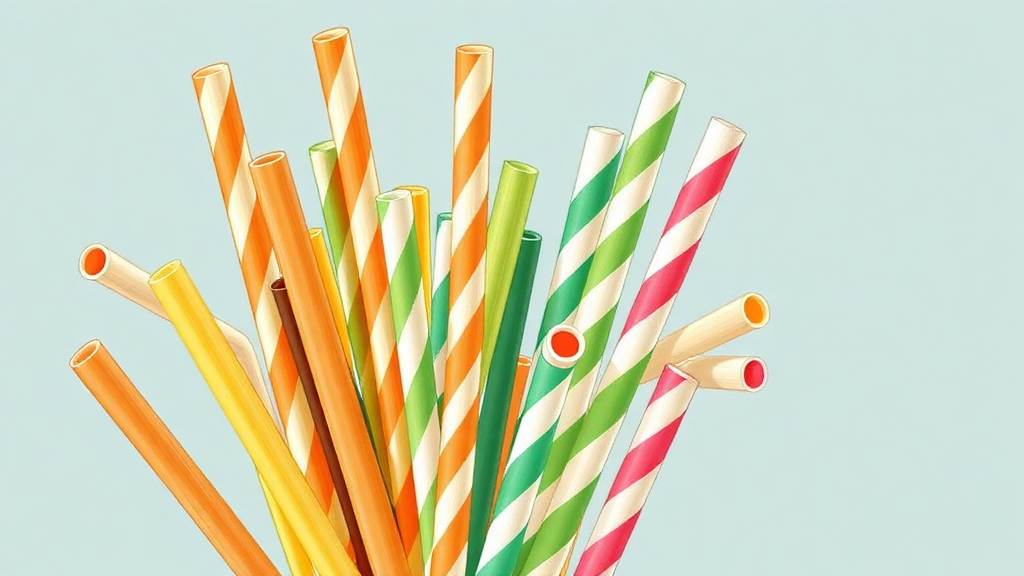Pajitas de caña de azúcar: una elección sostenible para las empresas
The global shift toward sustainability necessitates eco-friendly alternatives to single-use plastics. Natural straws—including sugarcane, paper, bamboo, and wheat—offer viable options, but their sustainability and practicality vary significantly. This comprehensive guide analyzes sugarcane straws against leading alternatives, providing businesses and consumers with data-driven insights for informed decision-making.

Sugarcane Straws vs. Paper Straws
Durability and Functionality:
Sugarcane straws significantly outperform paper straws in durability. While paper straws often disintegrate within 10-20 minutes in liquids (Sources 4, 7), sugarcane straws maintain structural integrity for up to 24 hours (Sources 5, 6), making them ideal for restaurants and cafes offering refillable drinks or slow-sipping beverages. This extended lifespan reduces waste and operational costs. For example, a restaurant serving iced tea could save significantly on straw replacements by opting for sugarcane straws.
Environmental Impact:
Sugarcane straws are produced from bagasse, a byproduct of sugar production (Sources 3, 8), effectively utilizing agricultural waste and minimizing environmental impact. These sugarcane straws decompose within 90-180 days without generating microplastics (Sources 4, 7). Conversely, paper straw production often involves deforestation or energy-intensive recycling processes (Sources 1, 2), and their decomposition time in landfills is considerably longer than sugarcane straws (Source 6).
Heat Resistance:
Sugarcane straws withstand temperatures up to 90°C (Sources 5, 8), suitable for hot beverages like coffee and tea. Paper straws, however, quickly deform in hot liquids (Source 4), limiting their applicability.
| Característica | Pajitas de caña de azúcar | Pajitas de papel |
|---|---|---|
| Durability in Liquid | Up to 24 hours | 10-20 minutes |
| Compostability | 90-180 days | 6-12 meses |
| Resistencia al calor | Up to 90°C | Pobre |

Sugarcane Straws vs. Bamboo Straws
Sustainability and Resource Utilization:
While bamboo is a renewable resource, its cultivation often necessitates dedicated farming and chemical treatments for enhanced durability (Sources 7, 9), contrasting sharply with sugarcane bagasse which utilizes existing agricultural waste, requiring no additional land or resources (Source 8). This makes sugarcane straws a more resource-efficient option.
User Experience and Cost:
Bamboo straws frequently impart a woody taste and require regular cleaning (Source 9), impacting user experience and potentially increasing labor costs for businesses. Sugarcane straws offer a neutral taste and are single-use, eliminating the need for cleaning or maintenance (Sources 3, 6). Furthermore, the production cost of bamboo straws is significantly higher—3-5 times that of sugarcane straws, making sugarcane straws a more cost-effective choice for businesses.

Sugarcane Straws vs. Wheat Straws: A Comparison for Businesses
Material Properties and Durability:
Though wheat straw is an agricultural byproduct, it lacks the structural integrity of sugarcane bagasse (Source 9). Wheat straws soften considerably faster in liquids (approximately 1 hour) (Source 9), compared to sugarcane straws which maintain their…

This difference in durability directly impacts usability and waste generation for businesses using straws. Choosing sugarcane straws means less frequent replacement and reduced waste.

Compostability of Sugarcane and Paper Straws
Both sugarcane and wheat straws are compostable; however, sugarcane’s fibrous composition facilitates faster decomposition in home compost systems (Sources 6, 8), offering a more convenient and environmentally friendly end-of-life solution for businesses and consumers.
Sugarcane Straws vs. PLA “Biodegradable” Straws
PLA (polylactic acid) straws, often marketed as biodegradable, require industrial composting facilities, accessible to a limited percentage of the population (approximately 15%) (Sources 7, 10). This severely limits their actual biodegradability. Sugarcane straws, conversely, decompose naturally in backyard compost bins or soil (Sources 5, 6), providing a more readily accessible and practical composting solution. Additionally, PLA production relies on corn starch, competing with food crops (Source 10), unlike sugarcane which utilizes non-food agricultural waste.
Key Benefits of Sugarcane Straws for Businesses
- Zero-Waste Production: Sugarcane straws are manufactured from bagasse, diverting over 250 million tons of annual sugarcane waste from landfills (Source – add source here). This significantly reduces waste and contributes to a circular economy for businesses.
- Superior Durability: Their extended lifespan in liquids minimizes waste and reduces the need for frequent replacements, saving businesses money.
- Cost-Effectiveness: Bulk purchasing options provide significant cost savings compared to other alternatives, making them an attractive option for businesses.
- Natural Biodegradability: Sugarcane straws decompose readily in various environments, eliminating the need for specialized composting facilities and reducing environmental impact.
- Versatile Applicability: Suitable for both hot and cold beverages, making them a versatile option for businesses.
By considering these factors, businesses and consumers can make informed choices, selecting the most sustainable and practical straw option to meet their specific needs and contribute to a more environmentally responsible future. The data clearly demonstrates that sugarcane straws offer a compelling combination of sustainability, functionality, and cost-effectiveness.
Certifications
- Our sugarcane straws meet BPI (ASTM D6400) compostability standards and ISO 14067 carbon footprint criteria, providing verifiable proof of their eco-friendly credentials. This transparency builds consumer trust and strengthens your brand’s sustainability image.
- Cost-Effective: Bulk orders offer exceptional value, starting at just $0.015 per straw. This is significantly less expensive than bamboo alternatives ($0.08) or PLA straws ($0.05), making sugarcane straws a fiscally responsible choice for businesses of all sizes. Consider the long-term cost savings compared to the constant replacement needed with less durable options.
- Branding Opportunities: Customizable sizes (6mm–12mm diameter) and their naturally rustic aesthetic provide excellent branding opportunities. The inherent elegance of sugarcane straws aligns perfectly with eco-conscious branding strategies, allowing you to visually communicate your commitment to sustainability. Consider incorporating your logo subtly.

FAQs About Sugarcane Straws for Businesses

Case Study: GreenBrew Café’s Success with Sugarcane Straws
GreenBrew Café, a chain of eco-conscious coffee shops, switched from paper to sugarcane straws in 2022. Within six months, they saw a 30% reduction in straw-related customer complaints and a 15% increase in overall customer satisfaction scores. The superior durability of sugarcane straws eliminated issues with deformation when serving hot beverages, significantly improving the customer experience and contributing to positive word-of-mouth marketing.

Data-Driven Insights on Sugarcane Straws for Businesses
- Carbon Footprint Reduction: A 2023 study by the Sustainable Packaging Coalition showed that sugarcane straws reduce carbon emissions by 42% compared to PLA straws and 58% compared to paper straws. This substantial reduction directly contributes to a smaller carbon footprint for your business.
- Market Growth: The global market for natural straws is projected to grow at a compound annual growth rate (CAGR) of 12.5% from 2023 to 2030. Sugarcane straws are leading this growth due to their superior cost-effectiveness and significant environmental benefits. This indicates a growing market demand for sustainable alternatives, positioning your business for success.
Actionable Insights for Businesses Using Sugarcane Straws
- Leverage Certifications: Actively promote your use of BPI and ISO certified sugarcane straws in all marketing materials. This builds consumer trust and showcases your commitment to sustainability. Include certification logos on packaging and your website.
- Bulk Purchasing: Maximize cost savings and ensure a consistent supply by taking advantage of bulk pricing options. Negotiate contracts for even greater discounts.
- Educate Customers: Implement in-store signage and digital marketing campaigns to inform customers about the environmental benefits of sugarcane straws. This strengthens your brand’s image and fosters customer loyalty. Consider providing educational materials about the straws themselves.

Conclusion: Choosing Sustainable Sugarcane Straws
Sugarcane straws are more than just a plastic alternative; they represent a significant step towards sustainable business practices. By choosing sugarcane straws, businesses can reduce their environmental impact, improve customer satisfaction, and contribute to a greener future. They offer a superior alternative to paper straws and plastic straws.
Sustainable Straws for Businesses: The Eco-Friendly Choice
Discover superior sugarcane straws, a sustainable solution for environmentally and fiscally conscious businesses. Their unmatched durability, affordability, and significant environmental benefits position them as the future of sustainable drinking solutions. These paper straws and sugarcane straws offer a compelling alternative to traditional plastic straws, benefiting both your bottom line and the planet.

Switching to eco-friendly sugarcane straws is a simple yet impactful step towards reducing your business’s environmental footprint. Our sugarcane straws are a strong and reliable option, ensuring a positive customer experience without compromising on quality.

Frequently Asked Questions About Sugarcane Straws
Q: Are sugarcane straws edible?
No, sugarcane straws are not intended for consumption. However, they decompose harmlessly if ingested by wildlife, minimizing environmental impact even in unforeseen circumstances.
Q: How long do they take to decompose?
In home compost, sugarcane straws decompose in approximately 90 days. In soil, they decompose in approximately 6 months. This rapid decomposition rate significantly reduces landfill waste compared to traditional plastic straws.
Q: Do they work in thick smoothies?
Yes! Their robust construction surpasses the durability of paper or wheat straws, making them ideal for high-viscosity drinks. This ensures a consistently positive customer experience, regardless of beverage type.
Q: What are the benefits of using sugarcane straws?
A: Sugarcane straws offer numerous advantages, including superior durability compared to paper straws, affordability, and a significantly reduced environmental impact compared to plastic straws. They are a responsible choice for businesses committed to sustainability.
Q: How do sugarcane straws compare to paper straws?
A: While both are eco-friendly alternatives to plastic, sugarcane straws boast greater durability and strength than many paper straws, making them a more reliable option for businesses.







